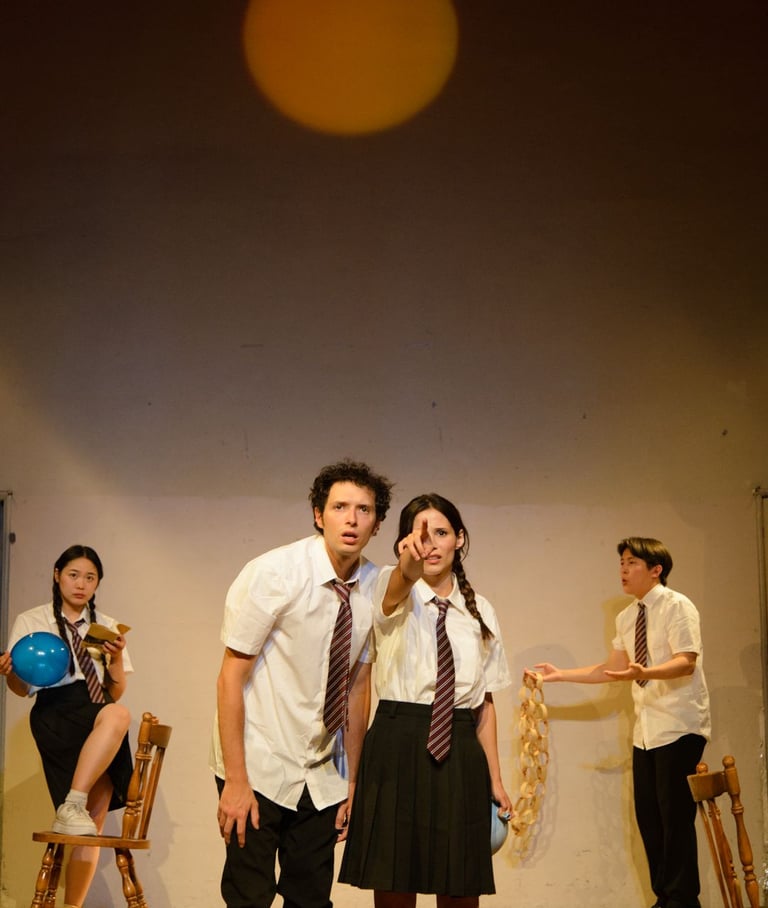REVIEW: Summers — Sweltering Heat, Life, Women’s Rights, and the Decay of Capitalism: How Many More Summers Must We Fight?
Review date: 28th June 2025@TheSpace Theatre
REVIEWS
Cassie Xue
6/30/20254 min read


Now playing at The Space Theatre, Summers is a fierce, experimental work that delves into climate catastrophe, systemic failure, and reproductive autonomy.
A collaboration between South Korean playwright Heejin Kim and Japanese director-performer Mia Sumida (who also plays one of the female roles), Summers explores the rising heat of a planet in crisis. Kim’s longstanding interest in multicultural, multilingual theatre finds precise resonance under Sumida’s direction, which uses physicality and language to evoke identity, intimacy, and political tension.
The play begins with a blazing red circular spotlight overhead—like a burning sun—and the sound of radio broadcasts reporting rising temperatures. Four high school students enter: the girls read while the boys mess around. None of them is named. Instead, they are symbolically referred to as The Girl and The Boy. The cast: The Girl 1 (Mia Sumida), The Girl 2 (Alia Al-Shabibi), The Boy 1 (Dong-Hyun Lim), and The Boy 2 (Pietro Cannizzaro).
As the heat intensifies, they begin to talk about the sun—until a deadly fire, caused by extreme temperatures and managerial negligence at a factory, tears through their world. Grief fractures their relationships. Alia Al-Shabibi’s anguished cries and Dong-Hyun Lim’s tearful accusations vividly depict the emotional toll. But deeper questions remain: was it the heat, the broken air conditioners, or lithium batteries that sparked the fire? Or was it the capitalists—the absent managers—who drained both the environment and human lives?
The play then shifts: time passes, climate reports echo in various languages, and the now-environmentalist boys reunite with the girls. The narrative fragments and recombines: couples are formed, split, and reconfigured. These seemingly disorienting shifts dramatise the kaleidoscopic nature of life paths and personal choice. Yet two themes remain constant: life and children.
Both girls express a desire to have children. Yet in this patriarchal society, reproductive choice lies with the boys. In mirrored scenes, both Dong-Hyun Lim and Pietro Cannizzaro respond to the possibility of pregnancy with nearly identical reasoning: It’s not the right time. A child would only cause more pollution. Do you really want to bring a child into this overheated world? Their words are chilling. As the sun swells redder and the characters don protective masks, the girls face blood cancer, the boys become teachers, and summer drags on.
The use of unnamed characters is a deliberate symbolic strategy, echoing the traditions of Expressionist theatre and Bertolt Brecht’s Epic Theatre, where naming is replaced by function. Characters are more archetypes than individuals—“The Girl” and “The Boy”—symbolising roles within a wider social structure. Their multilingual exchanges (each actor speaks in their native tongue) emphasise the global scope of climate devastation, turning language into a tool of both connection and conflict.
Yet this bold choice reveals a limitation. Without surtitles or captioning, much of the multilingual dialogue becomes inaccessible. While certain lines are repeated across languages, the nuance is often lost without translation. Subtitles or projected surtitles would greatly enhance comprehension, especially in a piece that moves swiftly and develops its themes through repetition and contrast.
Structurally, Heejin Kim’s pacing is one of the play’s strengths. Echoing lines across different character pairings—philosophical musings on life, the ethical dilemma of having children—creates thematic cohesion. Letting actors argue in their native languages enhances symbolic depth and supports the production’s central concerns.
Still, the breadth of themes—climate collapse, capitalism, reproductive justice, existential dread—is too ambitious for a 90-minute piece. Summers recalls Duncan Macmillan’s Lungs, especially in its coupling of ecological anxiety with parenthood. But whereas Lungs narrows its focus to deepen its exploration, Summers attempts to cover too much, often skimming the surface.
The theme of environmental protection is particularly weakened by overly extended speeches, which at times veer into slogan-like territory. Similarly, the critique of capitalism—while initially powerful, especially during the fire sequence—is later diluted. For instance, Dong-Hyun Lim’s character seeking sponsorship from an ecologically harmful corporation, or later references to expanding education for women to help mitigate climate change, feel too engineered and disperse the play’s focus. The playwright must choose a core thesis and allow it to unfold, rather than introducing a new issue in nearly every scene.
Another notable motif is the mushroom. These organisms—referenced throughout—survive in darkness, grow without sunlight, and form vast underground communication networks. They may symbolise post-collapse resilience or a new human condition. Yet due to the symbolic density and frequent shifts in tone, the metaphor risks getting lost or misunderstood.
The set is minimal—two wooden chairs serve as the only props. But in a work grounded in Expressionism and environmental critique, this sparseness works. It allows the actors’ physicality to dominate. Lighting is also effective: an orange glow turns blood-red as the heat rises. In the final mushroom-planting scene, green light and chaotic movement suggest the spread of poison or fungal mycelium—possibly humanity’s ultimate end, absorbed into a hidden network of decay.
Summers is bold and daring. Its fragmented structure, rising tension, and relentless heat embody the contradictions of modern existence. At its core, it leaves us with one unresolved, searing question:
“How many more summers must we fight?”
★★★★
For more information, please visit: https://www.instagram.com/mukuproduction?igsh=MTZwcDU2MnNtbDI0eg==
Cast & Creative Team
Cast: Alia Al-Shabibi, Mia Sumida, Dong-Hyun Lim, Pietro Cannizzaro
Writer: Heejin Kim
Director: Mia Sumida
Producer & Assistant Director: Li Xu
Stage Manager & Assistant Director: Simone Sklan
©Eiko Tokuoka
Sound Behind Curtain
A place for all Asian artists.
© 2026 Sound Behind Curtain. All rights reserved.
Your gift keeps the curtain rising for Asian creatives.
About
Contact
